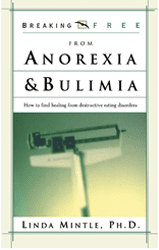NATIONAL EATING DISORDERS AWARENESS WEEK ends today. Be informed. Encourage someone who struggles to get help!
What causes eating disorders?
This simple question has a complex answer. Families are mystified as to what makes a 16 year-old jeopardize her health. Friends are disgusted by the vomiting sounds heard in college dorm room bathrooms. Husbands are baffled by their wives seeming inability to love themselves. Why do women and men abuse their bodies with food?
There is no one thing that predicts whether someone will submit to the bondage of these disorders. What we do know is that the causes are multiple, interactive and complex. No one factor stands alone. Keeping that in mind and knowing we don’t have definitive answers, here are some of the risk factors thought to lead to the predisposition and development of an eating disorder:
·History of a mood disorder (increased risk for bulimia) or family history of mood disorder
·Traumatic life events
·Genetics: Eating disorders do tend to run in families. Usually females are most affected. This may suggest that some people are predisposed to these disorders, but it certainly doesn’t eliminate the role other factors play. Research is currently being conducted looking carefully at the role of genetics. Heritable factors may be involved in the development of an eating disorder. However causation is difficult to determine given other contributing factors.
·Family history of substance abuse may increase the risk for bulimia
·Odd family eating habits and strong concern about appearance and weight may translate to family members
·Dissatisfaction with body and desire to be thin
·Dieting appears to be an entrée to an eating disorder for women and exercise for men
·Normal development events such as the onset of puberty, leaving home, the beginning of a new relationship, particularly with the opposite sex.
·Repeated negative comments on appearance
·Emphasis on thinness among upper and middle class women and female adolescents
·Positive family history of eating disorders coupled with dieting
·Personality traits: For anorexia the risks include affective over control and intolerance, lack of self-direction and personal effectiveness, and difficulty adapting to developmental tasks. There is some evidence for the contribution of affective instability and poor impulse control in developing bulimia.
If you know someone who struggles with an eating disorder, tell him or her to get help. Treatment works and help is available



